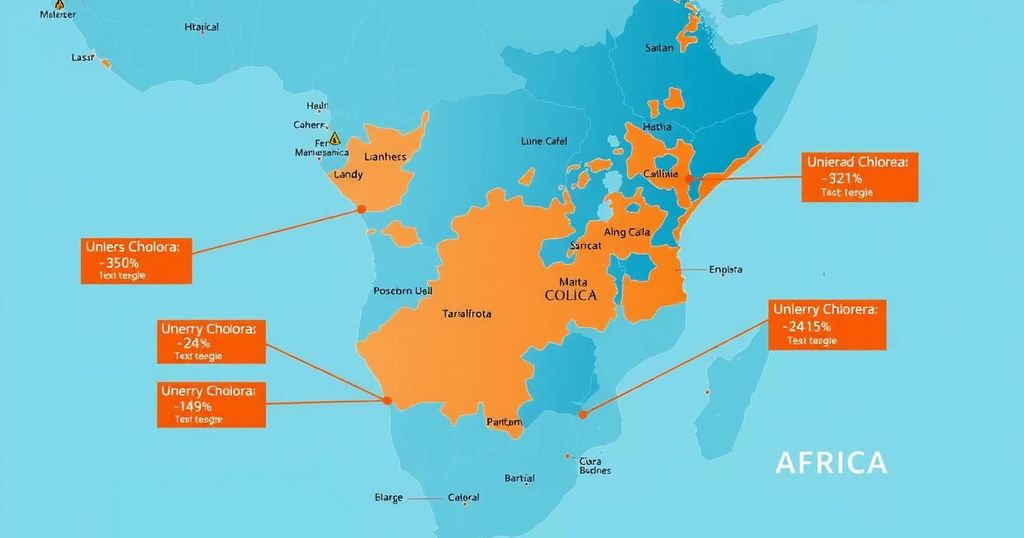Cholera Death Toll in Africa Surpasses 2,400: South Sudan Most Affected

The cholera death toll in Africa has surpassed 2,400, with major outbreaks in South Sudan, DRC, Angola, and Sudan. The Africa CDC reports over 115,000 cases, stating an urgent need for a coordinated approach to contain the epidemic and improve water access and sanitation. The agency plans to apply lessons learned from the mpox response to combat cholera effectively.
As of mid-May 2025, the Africa Centres for Disease Control and Prevention (Africa CDC) reported that cholera continues to wreak havoc across the continent, with 2,424 deaths linked to over 115,000 cases. This alarming death toll signifies a growing health crisis, mainly in countries such as South Sudan, the Democratic Republic of the Congo (DRC), Angola, and Sudan. South Sudan is the hardest-hit, recording 848 fatalities from the disease.
Deputy incident manager for mpox at Africa CDC, Yap Boum II, described the current outbreaks in the hardest hit countries as “severe.” He highlighted that a staggering 84 percent of cholera cases and 92 percent of deaths are concentrated in South Sudan, DRC, Angola, and Sudan. The statistics are grim, with Angola and the DRC suffering 609 and 513 deaths, respectively.
The primary cause of the cholera spread has been identified as a lack of access to clean water and proper sanitation, exacerbated by fragile health systems across many African nations, which are already battling other disease outbreaks. Boum emphasized the need for a unified response, stating, “A coordinated regional and continental response is urgently needed to control the spread of cholera outbreaks across Africa.”
Efforts to contain the cholera epidemic are being framed within the context of lessons learned from the mpox outbreak. The Africa CDC believes these strategies can be effective against cholera as well. Principal Advisor to the Africa CDC Director General, Dr. Ngashi Ngongo, indicated that the same collaborative tactics will now target cholera, leveraging partnerships similar to those established during the mpox response.
Meanwhile, UNICEF has provided alarming numbers, reporting over 178,000 cholera cases across 16 Eastern and Southern African countries from January 2024 to March 2025, leading to more than 1,600 deaths. Countries notably affected include Kenya, Angola, and Ethiopia, with the major burden falling on South Sudan, DRC, Sudan, and Angola, showcasing the ongoing challenge of conflict exacerbating healthcare deficiencies.
To address cholera effectively, the Africa CDC has established the Incident Management Support Team (IMST), which collaborates with the World Health Organization and other partners like UNICEF. This team aims to implement an integrated response that also includes care for diseases such as measles and chickenpox. According to Ngongo, this approach will strengthen essential areas such as surveillance and laboratory capacity across the continent.
Despite ongoing efforts, public health experts are candid about the need for a foundational approach. Improving water quality, sanitation, and hygiene stands out as a need for long-term solutions to cholera’s root causes. Additionally, Ngongo advocated for a robust African pooled procurement mechanism to ensure local production of cholera vaccines, which have unfortunately been in limited supply.
Cholera outbreaks in Africa have claimed over 2,400 lives in 2025, with South Sudan, DRC, Angola, and Sudan being the most affected. The Africa CDC emphasizes the urgent need for a coordinated response, leveraging lessons from recent health crises like mpox. While vaccination and treatment efforts are crucial, addressing root causes through improved sanitation and water access is equally vital. Contributors to the growing health crisis include conflict and insecurity, challenging the public health strategy.
Original Source: eastleighvoice.co.ke







